NSG 124
Herzing University
Page 2 out of 96 results
Sort by
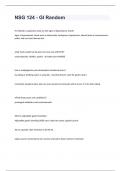
-
NSG 124 - GI Random Herzing University - Questions with complete solution
- Exam (elaborations) • 19 pages • 2024
- Available in package deal
-
- $13.99
- + learn more
NSG 124 - GI Random Herzing University - Questions with complete solution NSG 124 - GI Random If GI bleed is suspected, what are the signs of hypovolemic shock? signs of hypovolemic shock such as tachycardia, tachypnea, hypotension, altered level of consciousness, pallor, and cool and clammy skin. what meds would not be given to some one with PUD? corticosteroids, NSAIDs, aspirin - all make ulcers WORSE how is midepigastric pain eliminated in duodenal ulcers? by eating or drin...
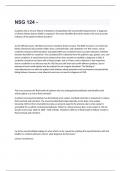
-
NSG 124 Herzing University - Question and answers correctly solved
- Exam (elaborations) • 21 pages • 2024
- Available in package deal
-
- $13.49
- + learn more
NSG 124 Herzing University - Question and answers correctly solved NSG 124 - A patient with a 25-year history of diabetes is hospitalized with uncontrolled hypertension. A diagnosis of chronic kidney disease (CKD) is suspected. The nurse identifies that which study is the most accurate indicator of the patient’s kidney function? As the GFR decreases, the BUN and serum creatinine levels increase. The BUN increase is not only from kidney disease but also protein intake, fever, corticos...
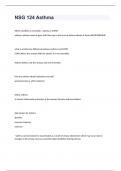
-
NSG 124 Asthma Herzing University - Question and answers verified to pass
- Exam (elaborations) • 23 pages • 2024
- Available in package deal
-
- $12.59
- + learn more
NSG 124 Asthma Herzing University - Question and answers verified to passNSG 124 Asthma Which condition is reversible - asthma or COPD? asthma; asthma comes & goes with flare-ups in the form of asthma attacks & these ARE REVERSIBLE! what is another key difference between asthma and COPD? COPD affects the airways AND the alveoli, it is not reversible. Asthma affects only the airways and it IS reversible. how are asthma attacks/episodes reversed? spontaneously or with treatmen...
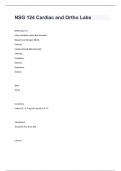
-
NSG 124 Cardiac and Ortho Labs Herzing University -Question and answers already passed
- Exam (elaborations) • 5 pages • 2024
- Available in package deal
-
- $13.49
- + learn more
NSG 124 Cardiac and Ortho Labs Herzing University -Question and answers already passed NSG 124 Cardiac and Ortho Labs BMP (Chem 7) basic metabolic panel that includes: Blood Urea Nitrogen (BUN). Calcium. Carbon Dioxide (Bicarbonate). Chloride. Creatinine. Glucose. Potassium. Sodium. BUN 10-20 Creatinine males 0.6 - 1.2 mg/dL; female 0.5-1.1 Cholesterol should be less than 200 calcium
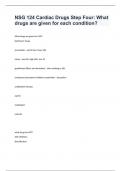
-
NSG 124 Cardiac Drugs Step Four Herzing University - Question and answers 100% correct
- Exam (elaborations) • 3 pages • 2024
- Available in package deal
-
- $13.99
- + learn more
NSG 124 Cardiac Drugs Step Four Herzing University - Question and answers 100% correct NSG 124 Cardiac Drugs Step Four: What drugs are given for each condition? What drugs are given for CAD? lipid lower drugs: simvastatin - watch liver, lower LDL niacin - low LDL, high HDL, low Tri gemfibrozol (fibric acid derivative) - does nothing to LDL cholesterol absorption inhibitors (exetimibe) - absorption antiplatelet therapy: aspirin clopidogrel naturals
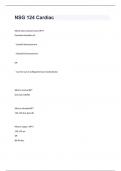
-
NSG 124 Cardiac Herzing University - Question and answers rated A+
- Exam (elaborations) • 13 pages • 2024
- Available in package deal
-
- $13.99
- + learn more
NSG 124 Cardiac Herzing University - Question and answers rated A+ NSG 124 Cardiac When does someone have HPT? Persistent elevation of: – Systolic blood pressure – Diastolic blood pressure OR – Current use of antihypertensive medication(s) What is normal BP? less than 120/80 What is elevated BP? 120-129/less than 80
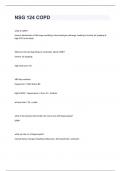
-
NSG 124 COPD Herzing University - Questions with complete solution
- Exam (elaborations) • 13 pages • 2024
- Available in package deal
-
- $14.99
- + learn more
NSG 124 COPD Herzing University - Questions with complete solution NSG 124 COPD what is COPD? chronic destruction of the lungs resulting in decreased gas exchange, leading to chronic air trapping & high CO2 in the body What are the two big things to remember about COPD? chronic air trapping high CO2 (over 45) ABG key numbers hypoxemia = PaO2 below 80 High PaCO2 = hypercapnia = Over 45 = Acidosis
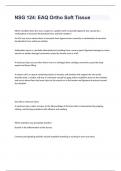
-
NSG 124 EAQ Ortho Soft Tissue Herzing University - Question and answers correctly solved
- Exam (elaborations) • 6 pages • 2024
- Available in package deal
-
- $13.99
- + learn more
NSG 124 EAQ Ortho Soft Tissue Herzing University - Question and answers correctly solved NSG 124: EAQ Ortho Soft Tissue Which condition does the nurse suspect in a patient with a traumatic ligament tear caused by a combination of excessive deceleration force and limb rotation? An ACL tear occurs where there is traumatic knee ligament tear caused by a combination of excessive deceleration force and knee rotation. Subluxation injury is a partially dislocated joint resulting from a sever...
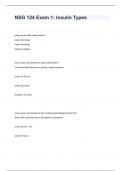
-
NSG 124 Exam 1 Insulin Types Herzing University - Question and answers verified to pass
- Exam (elaborations) • 2 pages • 2024
- Available in package deal
-
- $13.99
- + learn more
NSG 124 Exam 1 Insulin Types Herzing University - Question and answers verified to passNSG 124 Exam 1: Insulin Types what are the rapid acting insulins? Lispro (Humalog) Aspart (Novolog) Glulisine (Apidra) onset, peak, and duration of rapid acting insulin? 15 minutes feels like an hour during 3 rapid responses onset: 10-20 min peak: 30-3 hours duration: 3-5 hours onset, peak, and duration of short acting insulin (Regular Novolin R)? Short staff nurses went from ...
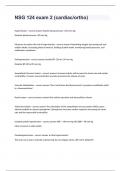
-
NSG 124 exam 2 (cardiac ortho) Herzing University - Question and answers already passed
- Exam (elaborations) • 15 pages • 2024
- Available in package deal
-
- $14.99
- + learn more
NSG 124 exam 2 (cardiac ortho) Herzing University - Question and answers already passed NSG 124 exam 2 (cardiac/ortho) Hypertension - correct answer Systolic blood pressure ≥140 mm Hg Diastolic blood pressure ≥90 mm Hg Measures to reduce the risk of hypertension - correct answer Maintaining weight, decreasing salt and sodium intake, increasing physical exercise, limiting alcohol intake, monitoring blood pressures, and medication compliance Prehypertension - correct answer Systoli...

That summary you just bought made someone very happy. Also get paid weekly? Sell your study resources on Stuvia! Discover all about earning on Stuvia


